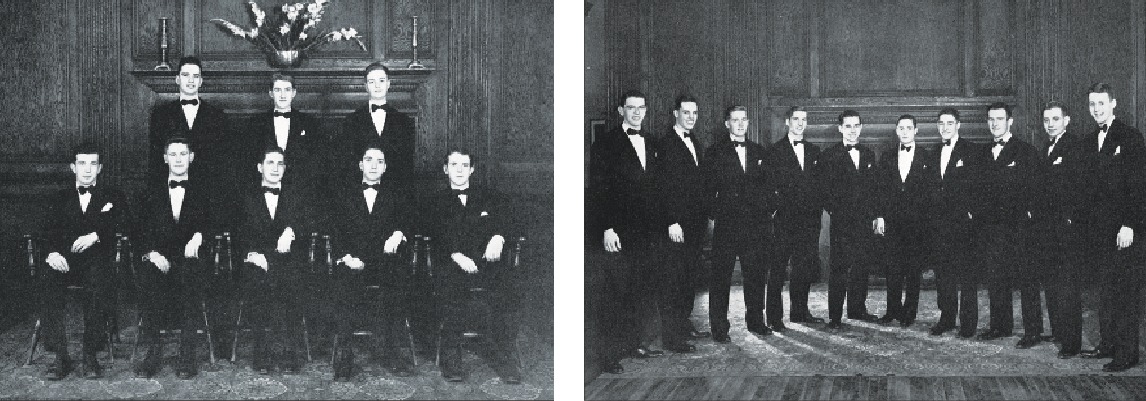
The Debate Council (left) and the Maiyeros (right) pose for a photo in the 1950 edition of The Brief, Choate’s yearbook.
Every September, the dull, grey basketball court on the side of the SAC transforms into a garden blooming with vibrant posters during Club Fair, an annual reminder of the wide breadth and depth of Choate’s clubs. But was it always this way? I went to the Archives to find out.
Clubs used to be centered around religious services and academic life. At The Choate School 50 years ago, an organization called Saint Andrew’s Cabinet had a lot of responsibilities. The Cabinet supervised the services at the Chapel and took Sunday collections, which would go to charities such as the Red Cross or the Tuberculosis Relief Association.
It also provided transportation for New Haven Tutors, a group of volunteers who taught basic reading, writing, and mathematical skills at The Bassett Street School. Some clubs from the early years of The Choate School still exist today, including the Student Council, the Honor Committee (a predecessor of the Judicial Committee), and The Choate News.
Similar to The Choate School, Rosemary Hall had a Chapel Committee. There were also several publications: The Wild Boar, the school newspaper; Sine Nomine, the Latin Magazine, and the Question Mark and Answer Book, which were the school’s literary magazine and the yearbook, respectively.
The Whimawehs and the choir groups, Alpha and Omega, filled the school with cheerful and merry songs. The Hospites were a group of girls who served as welcoming hosts of the school, especially during the alumni association meetings, and the Kindly Club Council sought to spread kindness and generosity around campus by organizing a yearly fair. In general, the scope of most clubs did not extend beyond Rosemary Hall.
However, by the early 1990’s, Choate Rosemary Hall’s campus culture, along with its clubs, broadened to include values and issues relevant across the nation and world.
The Environmental Action Coalition, for example, addressed the consequences of fossil fuel consumption on ecosystems. As the School’s only environmental group, it organized various activities that could spark interest in sustainability on campus.
The Hunger Task Force was founded in 1984 by Chaplain Dr. Gary Gruber, after he organized a day of fasting to bring attention to world hunger problems. The proceeds from the day went to organizations such as Oxfam America, which provided autonomous educational programs and emergency assistance to families in need.
Other social justice clubs included Amnesty International, Choate Afro-Latino Student Alliance (CALSA), and International Club.
Clubs have formed and dismantled continuously over the years. But one thing has remained constant: clubs reveal the values that the students deem vital to the school community.
Thank you to Ms. Judy Donald and Ms. Stephanie Gold, the school’s archivists, for their help and advice.




